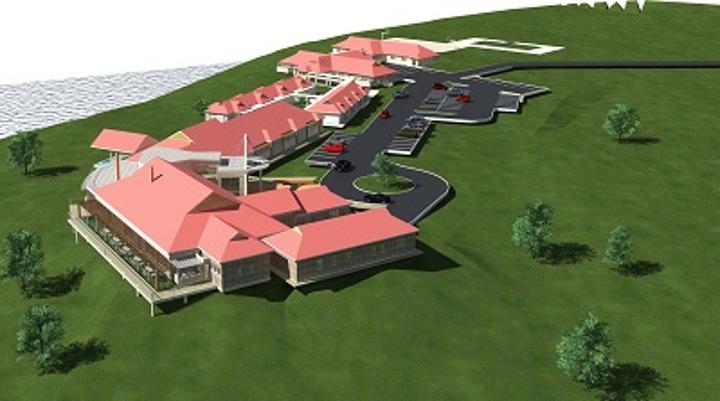Africa-Press – Lesotho. The Lesotho Highlands Development Authority (LHDA) has awarded the construction contract for the Katse Village upgrades to a Lesotho-based Unik Construction Engineering.
Construction commenced in early November and is expected to be completed in April 2023. The award comes a month after the completion of the civil works contract, which saw
the construction of platforms and bulk utilities at the proposed Polihali Village site and the temporary camps as well as utilities upgrades at Katse Village.
The Katse Village upgrades contract, valued at an estimated M131 million, is the first of the four housing construction contracts to be awarded. The remaining three housing construction
contracts are: the construction of the Polihali Village, construction of Polihali Commercial Centre and construction of Polihali Operations Centre. Procurement
processes for the above are at an advanced stage. These are expected to facilitate local participation, especially small and medium-sized contractors in keeping with
the terms of Article 10 of the Phase II Agreement. The Katse Village upgrades contract will increase capacity at Katse Lodge and diversify the services offered at the
facility. It includes the construction of an additional accommodation block, conference rooms, a fitness centre, a caravan park and upgrades to the backpackers’ facility.
Single quarters accommodation and parking areas will also be constructed at the Katse Village under this contract, to accommodate the Polihali Transfer Tunnel construction staff and the LHDA operations and
maintenance staff, during and post construction. “The extensions and upgrades will improve the experience of tourists who visit Katse and will ensure accommodation for the increasing number of visitors expected to be drawn to the
Polihali Dam developments and for the increasing numbers of people actively involved in Phase II construction,” confirms Mr Ntsoli Maiketso, the LHDA Phase
II Divisional Manager. The Katse Dam has a wall height of 185m and is Africa’s second largest double-curvature concrete arch dam and the centre piece of the Lesotho Highlands Water Project (LHWP).
The dam and the nearby botanical gardens have been major tourist attractions since the early 2000s. The Phase II infrastructure is expected to attract more tourists to the
area. More/ Polihali Infrastructure Consultants comprising the South African-based Mott MacDonald PDNA (Pty) Ltd and Khatleli Tomane Moteane Architects (Pty) Ltd of Lesotho was awarded the contract for the
planning, design and construction supervision of the Project housing and associated infrastructure in 2015. Phase II of the Lesotho Highlands Water Project builds
on the successful completion of Phase I in 2003. LHWP delivers water to the Gauteng region of South Africa and utilises the water delivery system to generate hydroelectricity for Lesotho.
Phase II will increase the current water supply rate of 780 million cubic metres per annum incrementally to approximately 1 270 million cubic metres per annum.
The increased water flow will simultaneously increase the energy generated by the ‘Muela hydropower plant, a further step in the process of securing an
independent power supply to meet Lesotho’s domestic needs. The hydropower further feasibility studies have confirmed that conventional hydropower is the preferred option for Phase II. Three potential sites were identified: two on the Senqu River and a third site at Oxbow on the Malibamats’o River. Ends.
About
The Lesotho Highlands Water Project (LHWP) is multi-phased, multi-billion Maloti/Rand project between the governments of the Kingdom of Lesotho and the Republic of South Africa.
It comprises water transfer and hydropower generation components with associated ancillary developments. The water transfer component entails the construction of dams and tunnels in Lesotho, enhancing
the use of water from the Senqu (Orange) River and its tributaries by storing, regulating, diverting and controlling the flow to effect the delivery of
specified quantities of water to South Africa, and utilizing the delivery system to generate hydro-electric power in Lesotho. The major works of Phase I included the construction
of the Katse Dam, the transfer and delivery tunnels, Matsoku Weir, ‘Muela Hydropower Plant and the Mohale Dam. The Phase II water transfer component comprises a dam at Polihali and a gravity tunnel that will connect the
reservoir at Polihali with the Katse reservoir. The further feasibility studies for the hydropower component of Phase II have concluded that conventional
hydropower is the more feasible option to meet Lesotho’s energy needs. Three potential sites were identified: two on the Senqu River and a third site at
Oxbow on the Malibamatšo River. The Lesotho Highlands Development Authority (LHDA) is the implementing and management authority of the Lesotho Highlands Water
Project, on behalf of the government of Lesotho. For additional information, please contact: The Public Relations Manager on +266 22246000 or phakoem@lhda. org. ls or lhwp@lhda. org. ls or visit www. lhda. org. ls
For More News And Analysis About Lesotho Follow Africa-Press






